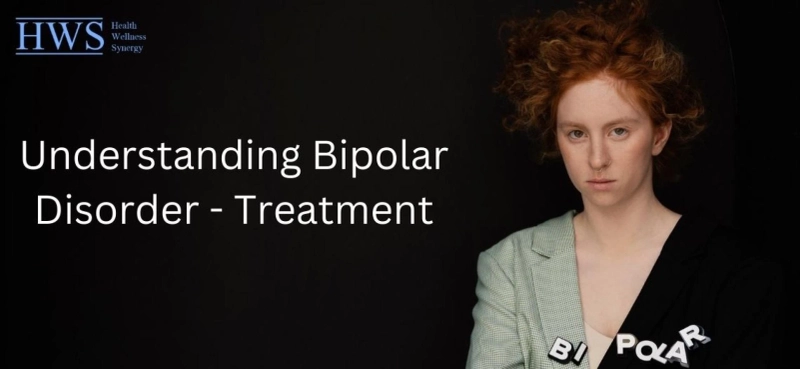Bipolar disorder is a mental health condition that impairs a person's ability to function, energy level, and mood. It goes by the name "manic depression" and is marked by bouts of mania or hypomania (extreme highs and lows) (depression). In between these episodes, people with bipolar disorder could experience times of stable mood. For people who are affected by it, as well as their loved ones and carers, it is crucial to comprehend bipolar disease and its treatment.
Although the precise origin of bipolar disease is unknown, a combination of hereditary and environmental factors is thought to be responsible. Although it can arise at any age, the illness usually first manifests itself in late adolescence or early adulthood. Bipolar disorder can cause significant mood fluctuations, changes in energy level, and trouble sleeping, among other symptoms that can vary greatly from person to person.
Drugs and counselling are frequently used in the treatment of bipolar illness. Lithium, valproate, and carbamazepine are a few examples of mood stabilisers that are commonly used to treat bipolar disorder. Antipsychotic drugs may also be prescribed to treat mania or hypomania symptoms. Antidepressant drugs can be used to treat depression in some circumstances, but care must be taken because they might cause manic episodes in some people.
Talk therapy or psychotherapy is a crucial part of the treatment for bipolar disorder. People with bipolar disorder can learn how to regulate their symptoms and develop coping mechanisms by participating in cognitive-behavioral therapy (CBT). Furthermore useful for enhancing communication and lowering stress levels within the family is family counselling.
There are numerous lifestyle adjustments that can help control the symptoms of bipolar disorder in addition to medication and therapy. Maintaining general health and wellbeing requires regular exercise, a balanced diet, and enough sleep. Moreover, since they can cause mood swings and conflict with medicine, narcotics and alcohol should be avoided.
With the right care and assistance, people with bipolar disorder are able to live happy, productive lives. To create a tailored treatment plan that addresses the individual's particular needs, close collaboration with a mental health expert is essential. People with bipolar disorder can better control their symptoms and overall quality of life with the correct treatment.
Depression Remedies Without Drugs
While medication is typically the mainstay of treatment for bipolar disorder, continuous psychotherapy is crucial to help patients comprehend and accept the disruptions caused by previous episodes in their personal and social lives and to help them better cope with future ones. It has been demonstrated that some types of psychotherapy, including as cognitive-behavioral therapy, interpersonal/social rhythm therapy, family therapy, and group therapy, can hasten recovery and enhance functioning in people with bipolar disease. Routine psychotherapy also helps patients stay on their meds because denial is a common issue and maintaining drug compliance can be challenging in adolescence.
When a patient is excessively manic or depressed, doesn't react to medicine, or exhibits symptoms while pregnant, electroconvulsive therapy (ECT) may be utilised. It may be especially useful for seriously ill patients who are at a high risk for trying to commit suicide because it can act swiftly. Due in part to inaccurate, unfavourable representations of ECT use in the media, ECT fell out of popularity in the 1960s. Modern methods, however, have proven to be both extremely safe and effective. Prior to administering a muscle relaxant, the patient is first administered anaesthesia. The next step is to induce a brief grand mal seizure that lasts less than a minute while the patient is asleep by applying a modest electric current to electrodes implanted on the scalp. Six to twelve treatments, normally given three times each week, make up a course of treatment. Lithium and other mood stabilisers may be stopped temporarily during ECT treatments, which last two to four weeks on average, in order to reduce side effects. Once the treatment is over, they are then restarted.
The more recent non-pharmacological depression treatments include:
In order to cure depression, VNS (Vagus or Vagal Nerve Stimulation) entails implanting a device that provides electrical signals to the vagus nerve.
As a method of treating depression, TMS (Transcranial Magnetic Stimulation) uses an electromagnetic coil to generate electrical currents and stimulate nerve cells in the brain's mood centres.
When bipolar disorder is linked to seasonal affective disorder, light therapy has shown to be an effective adjunctive therapy. Sitting in front of a customised light box with a full-spectrum light for 20 to 30 minutes each day can help alleviate sadness in persons who often experience it in the winter.
Bipolar disorder and the home environment
If you share a home with someone who has bipolar disorder, try to keep things peaceful, especially when they're going through a manic period. Be consistent with your everyday habits for eating, sleeping, and exercising. In order to stop episodes from starting, getting enough sleep is crucial. Avoid overstimulating yourself. Long stretches of watching television or movies, enthusiastic conversation, and parties can all worsen manic symptoms. Alcohol and illegal drugs can exacerbate or induce mood disorders, as well as reduce the efficacy of prescription medications.
IMPORTANT! Aid and Assistance
Bipolar disorder individuals may partake in unsafe behaviours during the manic phase, such as speeding or playing certain dangerous sports. Particularly in a car, they should be watched and restrained from taking dangers. Caffeine-containing foods and beverages including tea, coffee, and cola should only be consumed in moderation. Alcohol should never be consumed. It is crucial that a patient who is exhibiting manic symptoms have immediate mental evaluation. Because patients who are experiencing a manic or hypomanic episode frequently lack awareness of their illness and may reject therapy, family members may need to call the doctor. However, early action, including potential medication modifications, may stop subsequent issues and the requirement for hospitalisation.



